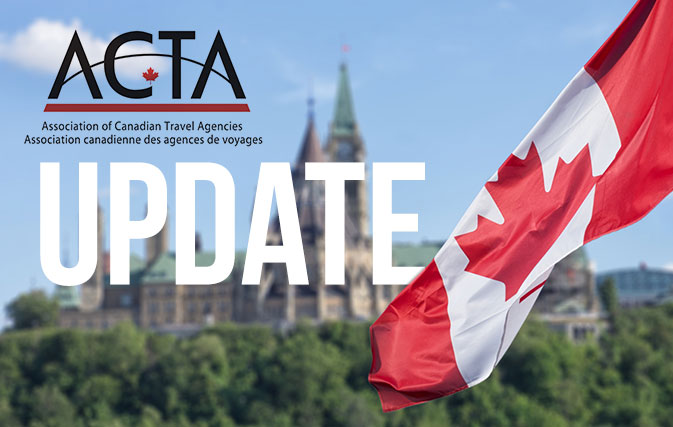TORONTO — While the federal government’s Fall Economic Statement didn’t include any further details about a bailout for Canada’s airlines, or protection for other sectors of the travel industry including travel agents, there was some good news.
ACTA says several initiatives highlighted in the Nov. 30 update were ones that ACTA has been lobbying for these past many months.
As for an airline industry bailout and whether or not the government will heed the industry’s call for commission protection amid mass airfare refunds, ACTA President Wendy Paradis says: “We understand that discussions between airlines and the government are still going on about this very important financial support and that ACTA will continue to advocate that any airline aid package that is tied to refunds for cancelled flights must address the commission recall to travel agencies and travel agents.”
Here’s a look at the wins from the Fall Economic Statement:
- The government is increasing the Canada Emergency Wage Subsidy (CEWS) to 75% from Dec. 20, 2020 through March 13, 2021.
- The Canada Emergency Rent Subsidy (CERS) program will be extended at the current 65% base rate through to March 13, 2021. “This support measure is very important, as over 70% of travel agencies were not able to tap into the original rent subsidy program,” says ACTA, adding that there is also a top up to 90% for businesses shut down due to public health guidelines. ACTA says it will continue to lobby to have travel agencies eligible for the higher amount.
- The newly created Highly Affected Sectors Credit Availability Program (HASCAP) offers 100% government-guaranteed financing for heavily impacted businesses including travel agencies, providing low-interest loans of up to $1 million over extended terms, up to 10 years and at rates lower than those offered in the BCAP. ACTA and a number of travel agency leaders, along with the hardest hit industries coalition, lobbied government extensively for this program. The majority of Canadian travel agencies who applied for the BCAP loan program were denied loans simply because the industry they worked in was considered too high risk.
- The Canada Emergency Business Account (CEBA) program is being expanded, allowing access to an additional interest-free $20,000 loan, with half of this additional amount forgivable if repaid by Dec. 31, 2022.
Paradis notes that the government has not yet indicated it will extend the Canada Recovery Benefit (CRB) to June 2021, an issue that’s on the radar for travel agents and independent contractors. “However, it was already extended to the end of March and we have time to assertively lobby for an extension to June for the thousands of travel agents and independent contractors that are dependent on CRB for an income,” says Paradis.
She added that the government’s $565 million commitment to procure rapid tests is an essential component to a restart for the industry and reduce the 14-day quarantine.
Paradis says that over the coming days ACTA will be speaking to government contacts to get further clarity on these programs and how they relate to ACTA’s 6-Point Plan and the recommendations proposed for sector-specific aid and a tailored approach through 2021, to save travel agencies and independent contractors from devastating and widespread bankruptcies.
“While the FES does not go far enough to protect the thousands of Canadian jobs in the travel industry, it does go a long way to answering some of our hard-fought advocacy on wage subsidy, rent and helping with liquidity through HASCAP with 10 years to repay and low interest,” she said.

